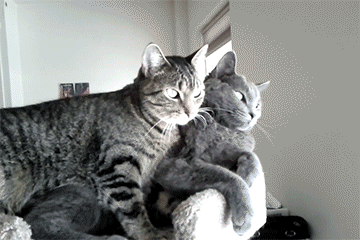Should a new cat be the same or the opposite sex to the resident cat? To put it another way, when adopting a second cat, is it better to get one of the same sex, or the opposite sex, of your current cat?
You are not going to get a definitive, science-backed, clear answer to the question, in my opinion. There are two sources for the answer; one is anecdotal i.e. based on personal thoughts and experiences, and the other is more scientific. I’m going to take the thoughts of the author of the article, “Is your current cat likely to accept another cat?”. The article is on the International Cat Care (ICC) website. I think it is accurate.

Dr Marty Becker DVM says this:
“It’s also a good idea to get a pet of the opposite sex. Even when pets are spayed or neutered, opposite-sex animals tend to get along better than those of the same sex.”
THERE ARE ARTICLES ON FRIENDSHIPS AT THE BASE OF THE PAGE.
ICC say that there is no conclusive evidence as to whether the gender of the cat has influence over that cat’s ability to get along with other cats when the cats are neutered. That sounds correct to me. In other words, there is too much emphasis on the gender of the incoming cat and how that influences the relationship between the incoming cat and the resident cat.
I believe that the biggest factors, in terms of whether an incoming cat gets along with a resident cat, is their respective personalities and how well socialised they are. There is such a thing as chemistry between cats and I think personality and character trumps gender when it comes to deciding if cats will get along.
Certainly, if cats are related, they will tend to get along better than cats who are unrelated. This is not a hard and fast rule. I can remember a cat rescue manager saying that the siblings she adopted fought all the time and she wouldn’t recommend that a person adopting siblings. If you can, I would adopt young siblings, a pair of cats who are closely related from a shelter. That is the advice of Jackson Galaxy and I think it is common sense advice.

There’s no guarantee it’ll work even then but it’s a question of maximising the chances of success. In one study about adopters’ reasons for returning rescue cats from shelters, they found that the primary cause was the incoming cat not getting along with other pets or children.
The contributors to the quora.com website are more positive and confident in their responses to the question. The general mood music in the answers provided by these visitors is that it is better to adopt a cat of the opposite sex to the resident cat when you want to enhance the possibility of a successful integration. One person says that opposite sexes is definitely easier, followed by two males, followed by two females being the most difficult.
To stress, they generally say that two females together are less likely to work than two males together and the opposite sex is the best. They don’t explain why. My research on Google scholar didn’t help me to explain why females are less likely to get along when they are unrelated and spayed. My immediate gut feeling is that females should get along better because adult females in colonies cooperate in raising their offspring. This points to the fact that females can be cooperative and get along. As I said at the beginning, you won’t find definitive answers to this question.

Clearly, this discussion is based upon the cats being spayed and neutered. That is the default position in homes in developed countries.
I have always thought that when adopting from a rescue centre, they should allow adopters to “suck and see”. They should allow people to return the cat without criticism or charge within, say, a period of about a week to see if there is some chemistry between the incoming cat and the resident cat. I know that the experts say that it takes time for a new cat to get used to the new environment and become friendly with the resident cat. That is true but I also believe that you can tell whether there is some chemistry and a good possibility of them getting along. Sometimes they simply don’t get along and never will. You want to know that within a week if you can figure it out.
You don’t want a situation where you are endlessly trying to shoehorn your new cat into your home but he or she never gets along with the resident cat or cats which results in a constant low-level friction between them. That is not a success and it severely undermines the benefits of having more than one cat.
SOME MORE ON FRIENDSHIPS:

